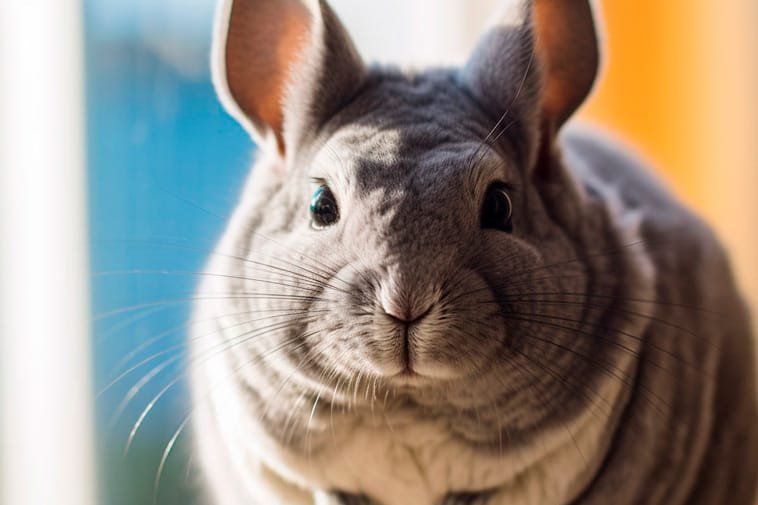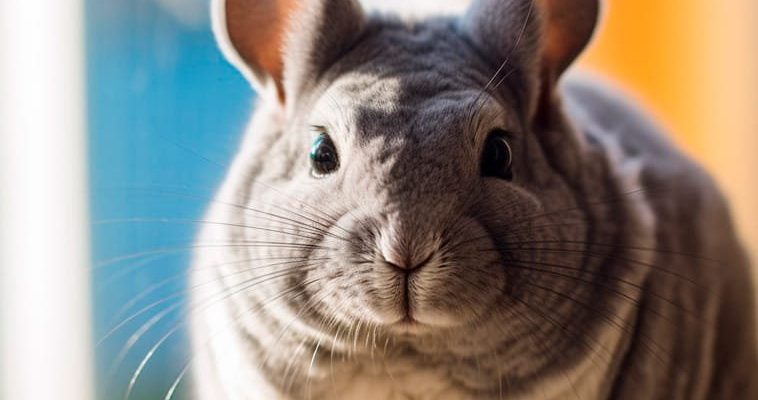
So, why should we care about understanding these health concerns? Well, chinchillas are prone to specific issues due to their unique biology and lifestyle. They can’t sweat, so they rely on a cool environment to manage their temperature. Additionally, their digestive systems can be sensitive, making them vulnerable to certain dietary problems. Once you understand these quirks, you can better prepare to give your chinchilla the best life possible. Let’s dive into the most common health concerns you should keep an eye on and learn how to prevent them.
1. Dental Problems
Just like us, chinchillas need to take care of their teeth. Their teeth grow constantly throughout their lives, which means they need to chew on things to wear them down. If they don’t, they can develop issues like overgrown teeth, which can lead to pain, difficulty eating, and even infections. You might be wondering how to prevent these dental problems.
Providing appropriate chew toys is essential. Options like untreated wood blocks, hay cubes, or specially designed chinchilla toys can alleviate some of that weariness. Additionally, a diet high in fiber will help ensure that their teeth remain healthy. This means plenty of grass hay and limited pellets.
If you ever notice your chinchilla struggling to eat or drooling excessively, it’s crucial to take them to a vet who specializes in exotic pets. They can check for any dental issues and take preventive measures before it gets too serious.
2. Gastrointestinal Issues
Gastrointestinal (GI) problems can be quite common in chinchillas. Their digestive systems are delicate, and a sudden change in diet or stress can lead to issues like diarrhea or bloating. It’s a bit like changing your diet from healthy salads to junk food overnight—your body might not handle the switch very well.
To prevent GI issues, it’s essential to stick to a consistent diet. Providing a high-fiber diet rich in hay is super important. Avoid sudden changes to their food and introduce new treats slowly. Monitor your chinchilla’s droppings as they can tell you a lot about their health. If you notice anything unusual, consult a vet right away.
Lastly, stress is another factor that can throw off their digestion. Try to provide a stable environment without sudden loud noises or changes that might spook your chinchilla.
3. Heat Stroke
Chinchillas are surprisingly sensitive to heat. With their thick fur, they don’t handle high temperatures well at all. Imagine wearing a winter coat in the middle of summer—that’s what they feel like when the temperature rises. Heat stroke can occur when the environment becomes too warm, leading to serious health issues or even death.
To prevent heat stroke, ensure your chinchilla’s living space stays cool. You can add things like fans or air conditioning to their environment, especially during the summer months. It’s also wise to avoid placing their cage in direct sunlight. Providing cool surfaces, like ceramic tiles, can give them a place to chill and help them regulate their body temperature.
Watch for signs of heat-related stress, like excessive panting or lethargy. If you notice these signs, move them to a cooler location immediately and consult a vet if symptoms persist.
4. Respiratory Issues
Respiratory problems can also plague chinchillas, largely due to their sensitive lungs. Dusty bedding or hay, drafts, and temperature fluctuations can all contribute to breathing difficulties. It’s like trying to breathe in a windy dust storm—definitely not comfortable.
To prevent respiratory problems, always use dust-free bedding and hay. Look for products labeled specifically for small animals, which are often much safer for their lungs. Keep the cage in a draft-free area and maintain a stable temperature.
If your chinchilla shows signs of coughing, sneezing, or difficulty breathing, it’s time to seek veterinary advice. Quick action can make a significant difference in their recovery.
5. Fur Issues
Chinchillas are famous for their incredibly soft fur, but that beautiful coat can also lead to issues like fur ring, which occurs when fur grows around the genitals and causes blockage. It’s a little like when a piece of fabric gets caught somewhere it shouldn’t—definitely not a fun situation for anyone involved.
Regular grooming can help prevent fur-related problems. Use a soft brush to help remove loose fur and prevent matting. Moreover, ensure their living space is kept clean and dry. Any dampness can lead to skin issues, so keeping their habitat tidy is crucial.
If you notice any unusual fur losses or skin irritation, don’t hesitate to take them to the vet for advice on treatment and prevention.
6. Obesity
Like many pets, chinchillas can be prone to obesity, especially if they have a diet high in pellets and treats. Imagine them as tiny, fluffy couch potatoes—if they’re not moving around enough or eating the wrong foods, they might pack on the pounds.
To prevent obesity, focus on a diet that emphasizes high-fiber hay over pellets. Limit treats, and ensure they have plenty of space to exercise. Regular playtime outside their cage will keep them active and healthy.
If your chinchilla seems to have gained weight, it might be time for a check-up. Your vet can provide guidance on creating a balanced diet and a proper exercise routine.
7. Parasites
Parasites like mites or fleas can also be a concern for chinchillas, leading to discomfort, skin irritation, and even infections. It’s similar to how humans can feel miserable when dealing with pesky bugs; chinchillas definitely don’t enjoy it either!
To minimize the risk of parasites, keep their cage clean and avoid contact with other animals that may have parasites. Regular check-ups with the vet can help catch any infestations early, allowing for prompt treatment.
If you notice excessive scratching, hair loss, or scabs, consult your vet to determine the best course of action. They’ll help you get rid of those unwelcome guests quickly!
8. Regular Veterinary Care
The final piece of the puzzle in keeping your beige chinchilla healthy is regular veterinary care. Just like you wouldn’t skip your own dentist appointment, these little furballs need their check-ups too. Routine visits can help catch any potential health issues before they become serious problems.
Make sure to choose a vet who specializes in exotic pets, as they’ll be familiar with the unique needs of chinchillas. They can provide vaccinations, dental checks, and general health assessments. By maintaining this relationship, you’re investing in your chinchilla’s long-term health.
Also, keep a close eye on any changes in behavior or health outside of the vet visits. Sometimes you’re the first to notice something isn’t quite right, and your knowledge can help get them the care they need.
In conclusion, caring for a beige chinchilla can be incredibly rewarding, but it also requires attention and knowledge about common health concerns. By understanding issues like dental problems, gastrointestinal challenges, and the dangers of heat, you can take steps to prevent them and ensure your chinchilla lives a long, healthy life. So, consider this your guide to keeping that fluffy bundle of joy happy and healthy for years to come!

